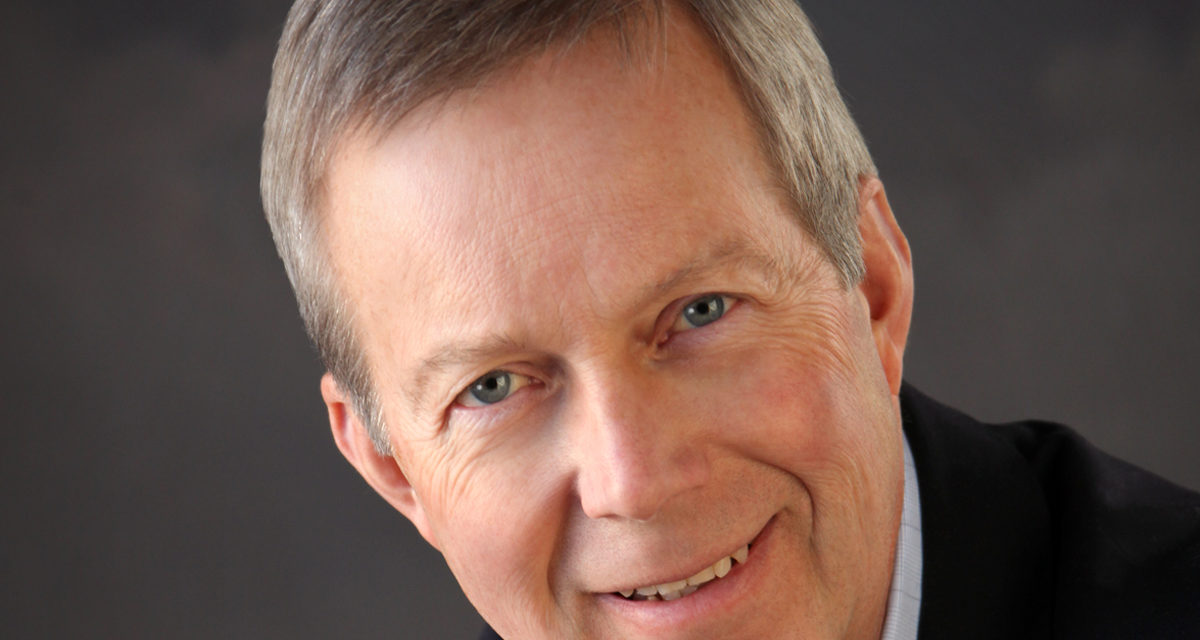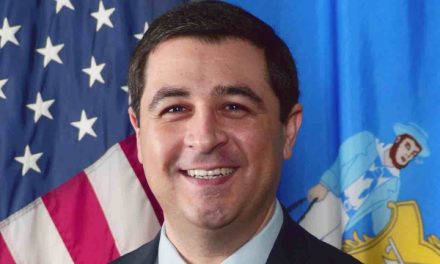
On the Record with Dr. Dean Gruner, CEO, ThedaCare

In 2014, ThedaCare CEO Dr. Dean Gruner penned a note to employees encouraging them to “walk like a penguin” during the winter months. Taking shorter steps over ice, he insisted, could help prevent falls. It’s a trick he picked up decades earlier after a childhood move from California to Minnesota, and among a number of actions ThedaCare took that winter to successfully decrease worker injuries.
Gruner is set to retire this month, ending a 40-year healthcare career where improvement has always been a focus. In a recent interview, Gruner discussed how the creation of the Wisconsin Collaborative for Healthcare Quality pushed ThedaCare forward on this mark, as did the affiliation of smaller hospitals in surrounding communities like Waupaca, Shawano and Wild Rose. He also provided a candid review of the House Republican reform proposal, which he said would likely not achieve needed improvements to the current law.
Edited excerpts are below.
WHN: What are you most proud of during your tenure as CEO of ThedaCare?
DG: What I was taught when I started medical school in 1976 was that safety and quality was a community property. And what my professors told me was what that meant was that no matter what I was doing, if somebody contacted me for help in improving safety and quality, the answer was always, “Yes.” In fact, though, we have not done a very good job of creating transparency of performance so we can see where we stand versus other organizations. So I’m really proud that in 2003 we helped start (the Wisconsin Collaborative for Healthcare Quality). That has raised everybody’s performance because you can see your performance versus your peers … From a ThedaCare perspective, I’m most proud of the work we’ve been able to do collaboratively. In our country, the default mechanism is to compete. But we’ve done some really great things with collaboration within our organization and within our community. It takes a lot of collaboration to work with other health systems. During my time, we’ve affiliated with New London and Shawano, Wild Rose, Berlin and Waupaca. That’s cool. We’ve created some cross-system work like Catalpa Health with Affinity Health System and Children’s Hospital of Wisconsin.
In the community, we’ve created some incredible collaborations with Voices of Men and the United Way and Habitat for Humanity. My experience has been that competition is fun, but if you can figure out how to collaborate with other people you can really do some marvelous work. Sometimes people say, “Well, we could never do that.” But then you start asking yourself the question, “But what if? What if we could do that? Wouldn’t that be cool?” And of course, we have not been successful in all the opportunities out there, but we’ve had a lot of success and that’s been really terrific.
WHN: Another collaboration that ThedaCare has participated in is AboutHealth. What’s the future of this network? Has it achieved what you thought it would at this point?
DG: Well, I would say that it, like many organizations that get started, it sort of has to search for its true identity. There was a time when we thought it might be the vehicle for us to all contract under a same insurance product. After examining that, we decided that was not really its true function. So we do think it will help us get better faster together than separately.
So this comes back to collaboration again. We’re breaking even, or better, from the standpoint of the benefit versus the cost. But the opportunity is to create a two or three or four times return on our investment. If we can improve quality more rapidly than by ourselves, and if we can reduce expenses more rapidly than we can by ourselves, that’s really cool. That’s what we’re really focused on. I’m optimistic about it, but the proof will be in the pudding over the next couple years.
WHN: You led ThedaCare during the debate over the Affordable Care Act and now leave amidst, again, great uncertainty as health reform is debated at the federal level. Would the American Health Care Act improve care?
DG: Well, I think back to when the Affordable Care Act was passed. There was widespread recognition that the American healthcare system had huge flaws. And I would say, when it passed and where we are today, it still has flaws. But if you use the 80/20 rule, 80 percent of the Affordable Care Act people agree with and think was good. So what a prudent person would do would be to examine the 20 percent that’s not working and fix the percent.
For instance, it dramatically reduced the number of uninsured. So, as a family practice physician, I know when somebody is uninsured they defer care. They don’t go see a primary care physician to try to treat their chronic diseases and illnesses. Instead, they can’t afford it, so then when they finally do get sick, now they’ve got a real whopper of a problem. They go to the emergency room, which is the most expensive place for care to be provided, and they have a much more serious problem that costs a lot more. So what do you get from that scenario? You get more anxiety for the people that don’t have health insurance. And then they actually have lower health and increased costs.
That’s why so many people are upset about any plan that will reduce it. It will increase the number of uninsured, and not only for pre-existing conditions. When somebody is not aware that they will ever be able to get insurance again and they’ve got a pre-existing condition, it’s not just the quality of care and the cost of that. The human toll on those people who now can’t get insurance is really tremendous. And it’s rather tragic that that would be something that people would raise as a solution to current problems.
I definitely think that the Affordable Care Act can be improved. I think where some people get themselves boxed in is when they say they have to do things like repeal. In my world, we always talk about improvement. And if something was better than before, that’s good. But then our job is to make it better yet, and make it better yet. It’s not about throwing away what you learned in the past seven or eight years and starting all over. It’s taking what we’ve got and make it better.
So I am, as you can understand, I’m not a fan of the current Republican reform proposal, the American Heath Care Act. I don’t think they really took the time to think that through. It is complicated, as someone has referenced, and was not even scored by the (Congressional Budget Office). So they really didn’t even know what the output of the legislation would be when they voted on it. And, like I say, that’s not the way I would run ThedaCare. I would not make a quick, sudden decision about something so important without really thinking it through. Because as a physician, I know there are times where patients would come into the emergency room and they would collapse or they would go have a Code Blue. Then you got to do something immediately. You’ve got to run the code instantaneously.
But this is a time where we need our best thinking to think through how can we improve on what we’ve done over the past years.
WHN: ThedaCare is a leader in lean principles. Is this something the system is still working on, or have you already eliminated all the waste you can?
DG: Well, we’ve had some big learnings over the last couple years. Like everything, you make some improvements and then you learn and then you got to make some more improvements. I think we spent a lot of time focusing on the process of improvement side of the work. And then we went through a period where we were saying, “Well, we had to balance the process of improvement part of lean with the people side of lean.” And what we think is a breakthrough in the last two years is we’ve learned that people are working in a process. So they’re not two different things.
We have merged our lean office with our organizational development office. These are people that are excellent in both process improvement and in leading people. At the end of the day, our business is about people. To the extent we can be more people centered and help develop people to use the lean tools, that will help us get better faster than we had been, say, a few years ago. Now that’s a challenging concept in that many people who start down a lean path think that lean is all about the tools, and they want to learn the tools.
If I had to do it over again, I would have focused more on the people earlier. That’s what lean is all about: plan, do, study, adjust. In fact, it fits into my conversation about the Affordable Health Care Act. They’ve planned, they’ve done, they should study it now and adjust. They shouldn’t: plan, do, throw the baby out with the bath water and start over.
WHN: Last year ThedaCare invested $3 million in Smart Choice MRI, which offers scans for a flat fee and could be seen as a competitor. Why was that decision made?
DG: Well, when they first announced they were going to be opening a Smart Choice MRI in our community, there was a great deal of consternation. Then as a team we said, “Well, what the heck? Why don’t we go talk to them.” And we went and talked to them. We discovered that really we could do two things.
One is we could really learn from somebody who was doing something innovative in healthcare but not part of the mainstream healthcare system. We thought that was a great reason to invest, to learn more about how they do things and how they think and how they approach.
And the second thing, we thought it would be a good investment. We thought this had potential to grow. And like anything that’s a startup, there’s more risk with it. But we have a certain part of our investment portfolio that are more in the venture capital designation. It’s not a very large part of our investment portfolio. We thought that fit into that part of our investment portfolio as an interesting way to invest not just in a venture capital project but in a healthcare sort of venture capital project and to see what we could learn from them along the way. So far they’re doing well. They continue to expand. We’ll see how it goes over the next few years. So far they have been successful in every market that they’ve entered.
WHN: Do you plan to stay involved with ThedaCare after you retire?
DG: Well, I’ll have to work that out with my successor, Dr. Imran Andrabi. I don’t plan to just sit around and play golf and fish. I’m going to take some time off. But then what I would like to do is probably work 20 to 30 hours a week within our community. My wife and I will stay living here. I could see spending five or 10 hours a week working for ThedaCare-related projects in the community. We’ll have to work that out over the next couple months, what makes sense and what doesn’t.





